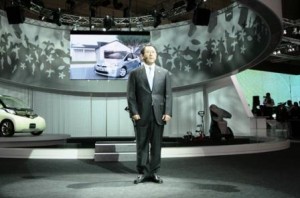Akio Toyoda, Toyota Motor Corporation President, announced this morning at its Nagoya, Japan, headquarters that he is forming a global quality special task force that will conduct regional quality improvement activities.
North American journalists were not invited to participate in the news conference and Toyota is not making available a transcript or audio replay of what was said. Only a terse press release is available, from which this report is formed.
The committee, headed by the scion of the founding Toyoda family, will conduct various “improvement initiatives.”
First among them is the claim, apparently made by Executive Vice President Shinichi Sasaki, that Toyota will verify the causes that led to several controversial and ongoing recalls.
Toyota will also enhance the customer information research offices to improve regional information collection and “genchi-genbutsu” or “go and see for yourself” activities.
Toyota said in the release that it would establish an “Automotive Center of Quality Excellence” in key regions.
Toyota will also seek confirmation and evaluation from “outside experts” of its newly improved quality-control management.
In addition, Toyota said it will work to increase the frequency of communication between itself and regional authorities.


Paul’s recent article on MSN as well as his recent appearance on television discussing Toyota safety issue coverups only mentions in passing the Audi “sudden and accidental acceleration” issues that almost destroyed the company in the mid 1980’s. This represents an ofuscation of historical fact and is disappointingly inaccurate reporting. There is absolutely no similarity between the Audi sissue and the issues that have been exposed at Toyota. Audi’s issues were completely fabricated by a television news and commentary service (CBS’s “Sixty Minutes”), after several people complained that the cars had taken on a mind of their own and “gone crazy”. This “sudden and accidental acceleration” was NEVER duplicated by anyone after testing by all theleading automotive testing laboratories and administrations. Eventually, Audi was directed to install a safety warning lable on the gear selector console, and the invettigation was dropped. Somewhat later, in very cmall print, CS admitted that their investigation of the claims was “incomplete” and not up to their normal “exhaustive” investigative journalistic standard. There is absolutely no similarity between the Audi history and the dontinuing exposure of signficant defects in Toyota automobiles.
Hi, Roger, and thanks for your note.
It is a reasonable argument, though let me explain why I disagree with your conclusion — at least on a couple points:
First, the reference to the Audi issue wasn’t unfair in that it was a huge and topical issue that did, as you point out, nearly destroy the company — at least in the U.S., which it gave serious consideration to pulling out of, in 1992, after sales plunged about 80% versus the peak before the scandal broke. I should note — and do, in interviews and stories where I have the time or space, and the topic is appropriate — that Audi WAS indeed ultimately cleared. BUT they not only added the warning label but also redesigned their pedal layout to prevent the possibility that drivers would accidentally step on either the wrong pedal or both the throttle and brake simultaneously. So, there was a mechanical issue addressed, even if NHTSA did not feel that justified a recall, nor justified a decision blaming Audi, with or without the need to make repairs.
I should point out, by he way, that I owned an Audi, during this period and had repeated problems with a sticky throttel, which would routinely stick at anywhere from 3,000 to 6,000 RPMs. It wasn’t a major problem getting around that matter when braking, but it did require an extra step, whether blipping the accelerator or shifting to neutral. This was a well-identified Audi issue and several friends with Audis suffered the same problem.
Meanwhile, there is an unpleasant similarity between the Audi and Toyota situations, which further justifies the comparison. Audi did just about everything wrong in terms of its handling of sudden or, if you prefer, unintended acceleration. It is a text book case and even the Audi folks today admit their mistakes only made the situation worse.
FYI, the reason CBS did not ultimately issue a full apology to Audi is interesting. After extensive legal wrangling, the producer of 60 Minutes was set to sign off on an apology. But then, Don Hewitt got word of some blatantly anti-semitic comments made in a rather public forum by a top Audi executive. Hewitt pointedly said he would never, at that point, give his approval. Confronted with their own lack of tact, Audi let the matter slide rather than have another scandal break.
Sadly, Audi is still tarnished. They could’ve minimized the damage then and certainly would do a different job today.
Paul A. Eisenstein
Publisher, TheDetroitBureau.com